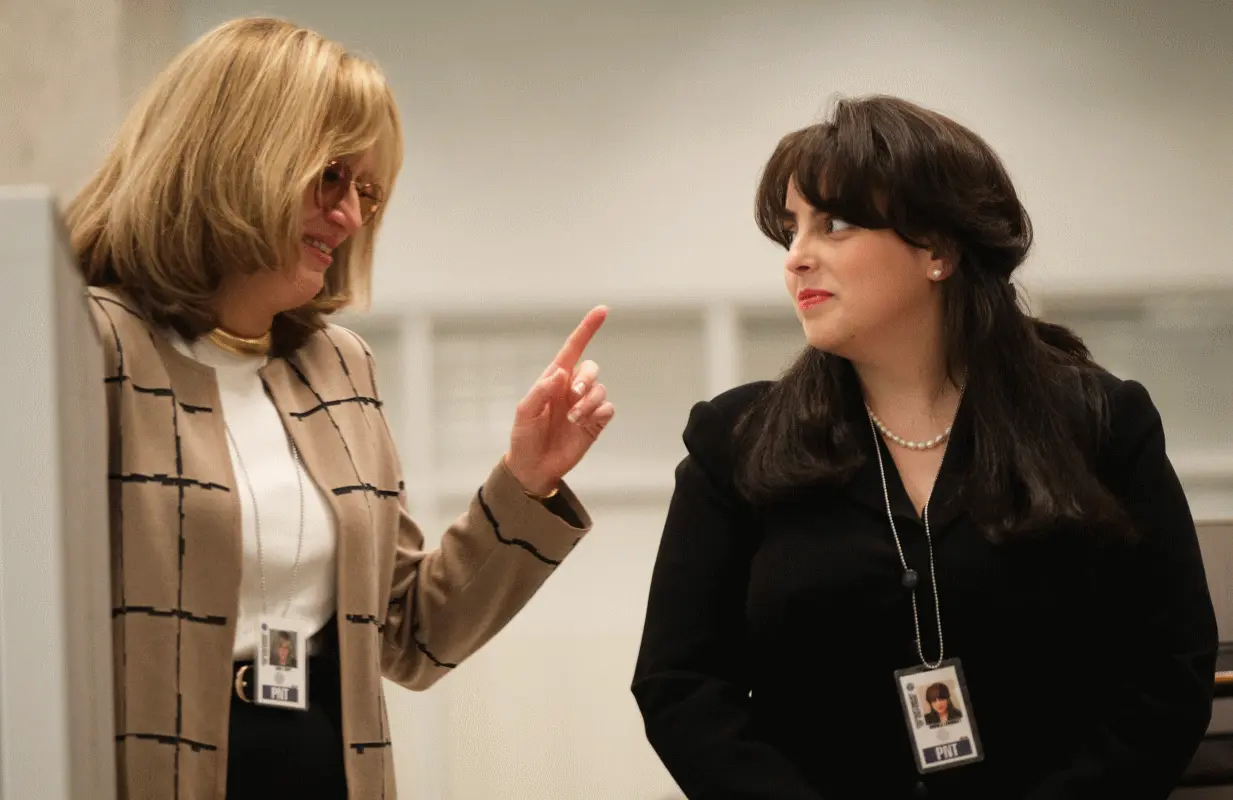Impeachment: American Crime Story Rises to the Challenge
-
 Sarah Paulson as Linda Tripp and Beanie Feldstein as Monica Lewinsky in Impeachment: American Crime Story: Impeachment. (Photo Tina Thorpe / FX)
Sarah Paulson as Linda Tripp and Beanie Feldstein as Monica Lewinsky in Impeachment: American Crime Story: Impeachment. (Photo Tina Thorpe / FX)The editor-in-chief of the daily newsletter Best Evidence, Sarah D. Bunting knows a thing or two about true crime. Her weekly column here on Primetimer is dedicated to all things true-crime TV.
That Impeachment: American Crime Story is as good as it is is somewhat miraculous. Like the two earlier seasons of American Crime Story, it tells the story of real-life figures, people whose images and actions are seared into so many of our brains thanks to the scale of the story at which they were the center. Unlike its predecessors, Impeachment also had to battle COVID-related production delays and scheduling conflicts, which conspired to postpone its premiere by a year.
And then there's the matter of its predecessors. The first two seasons of American Crime Story revisited the OJ Simpson case and the murder spree by Andrew Cunanan, which culminated in the shooting of Gianni Versace. Both set extremely impressive precedent, from the performaces to the direction to the resulting in-depth analyses of the episodes that prompted cultural re-examinations of our contemporary responses to both of these cases.
Impeachment: American Crime Story isn't a perfect season, but Ryan Murphy and crew have once again found a way to do what ACS does best: tell the story of a crime that also tells the story of why the country seized on the story of said crime. What really fascinated us about these cases? Was it the crimes themselves, or the anxieties these crimes kicked up in us about race, about fame, about homophobia, about power and influence?
At its best, American Crime Story has proven itself incredibly adept at two things: 1) selecting massive cases that are about many other intangible things besides the bare facts of their crimes; and 2) leveraging the distance we have from those cases now to figure out what we should have been paying attention to at the time.
It doesn't hurt that Murphy's characteristically starry cast is largely superb, beginning with Beanie Feldstein's star-making and heartbreaking performance as Monica Lewinsky. In a few cases — Sarah Paulson as Linda Tripp; Clive Owen as Bill Clinton — the prosthetics used to turn the actors into reasonable facsimiles of their IRL counterparts can be a bit distracting, but Paulson really does inhabit Tripp, nailing her hunched, pitched-forward gait and sour demeanor. Owen is slightly less successful as Clinton, particularly in scenes where the president is angry and Owen's gravelly accent slides off the surface of his performance to reveal the Brit underneath, but he's close enough to pass most of the time.
The show's cinematography is equally effective, reminiscent at times of Alan J. Pakula's political thrillers All The President's Men and The Parallax View, full of oppressive ceilings and long claustrophobic hallways that threaten to crush the characters. The shot-framing that always positions Clinton and other men in the story as looming over Lewinsky, physically condescending to her at the same time they're verbally patronizing her, all contribute to the sense that we're seeing the true heart of the story unfold, and it's not the one that turned Lewinsky into ten thousand late-night monologue jokes.
Impeachment isn't flawless. The season clearly wants us to re-examine the way we thought and said about the women in the story back then, from Lewinsky to Hillary Clinton to Janet Reno. It's less charitable with Tripp, who gets a lot of airtime (Sarah Paulson's performance is a symphonic rendition of bitter striving), and the portrayal of Paula Jones is similarly ambiguous: Annaleigh Ashford's rendition of "the complainant" is sweet and sad, and the show seems to be on her side in theory, but it's not especially eager to avoid classifying her as a dumb hick, either.
Nor is the portrait of Jones the only time Impeachment dismisses anything Arkansas as tacky and craven. I understand that the project is working off a book and can't go too far off-road in that regard, but given the author's own recent struggles with workplace propriety, it's not a great look.
A couple of other things don't work, like putting the phrase "I never like to take no for an answer" in the mouth of Brett Kavanaugh, then on Ken Starr's legal investigation team; such retroactive snark is understandably hard to resist, but it's a little much. For the most part, though, Impeachment is effective and eminently watchable, its top-notch performances arranged around an interrogation of truth, justice, and the American way (and whether any of those concepts truly exist).
Impeachment: American Crime Story premieres September 7th on FX, with new episodes airing Tuesdays at 10:00 PM through November 9th.
People are talking about Impeachment: American Crime Story in our forums. Join the conversation.
Sarah D. Bunting co-founded Television Without Pity, and her work has appeared in Glamour and New York, and on MSNBC, NPR's Monkey See blog, MLB.com, and Yahoo!. Find her at her true-crime newsletter, Best Evidence, and on TV podcasts Extra Hot Great and Again With This.
TOPICS: Impeachment: American Crime Story, FX, Beanie Feldstein, Bill Clinton, Monica Lewinsky, Ryan Murphy, Sarah Paulson, True Crime
- How did Amanda Knox and Monica Lewinsky meet? Inside their friendship as they team up for docudrama
- This Year's Emmy Race For Outstanding Limited Series Has a New Frontrunner
- Ryan Murphy's American Crime Story and Pose will stream on Hulu, along with American Horror Story
- FX boss: Lack of streaming options hurt Impeachment: American Crime Story